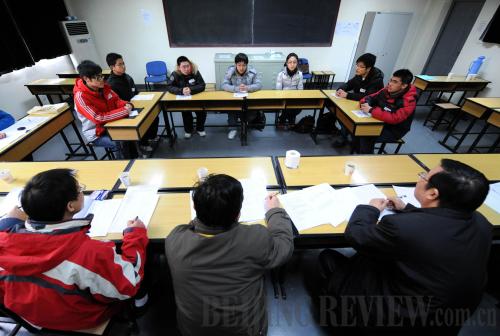|
 |
|
STUDENT RECRUITMENT: Several applicants to Southeast University in Nanjing of Jiangsu Province are interviewed by a recruitment committee. As of 2011, the Ministry of Education had given 80 universities autonomy to recruit 5 percent of incoming freshmen (SUN CAN) |
Recently, the Ministry of Education approved charters for six universities in a bid to deepen reform of the higher education system.
"Charters embody universities' governing philosophies and system. They spell out the basic principles of university management and chart a direction for instruction," said Sun Xiaobing, Director of the ministry's Department of Policies and Laws, on November 28. .
The six universities are Renmin University of China in Beijing, Southeast University in Nanjing of Jiangsu Province, Donghua University in Shanghai, Shanghai International Studies University, Wuhan University of Technology, and Central China Normal University in Wuhan, Hubei Province.
Within months, 25 more universities directly affiliated with the Ministry of Education will finish drafting their charters and submit them to the ministry for approval, while all universities are expected to finish making or amending their charters by the end of 2015, Sun said.
Charters will also help ensure the autonomy of institutions of higher learning, Sun said.
A decision to accelerate reform in public institutions such as universities and give more autonomy to them was made at the Third Plenary Session of the 18th Central Committee of the Communist Party of China held in November.
Sun said that the Ministry of Education will delegate more power to universities and release a plan to give universities more rights in administering their own affairs within a few months.
"A charter is a university's constitution. Other rules, regulations or activities should not violate it," said Wang Liming, a renowned legal expert and Vice President of Renmin university of China.
Charter highlights
The newly approved charters for the six universities have all highlighted universities' rights to manage their own affairs, including the right to decide their own scale and department layout, and to make recruitment plans.
For instance, the charter for Renmin University of China stipulates that, "The university will make a recruitment plan according to social needs, school conditions and the education scale authorized by the government. The university has the right to adjust the ratio between students to be admitted into different departments."
The charter of Shanghai International Studies University states that, "The university has the right to run itself according to law, free from illegal interference from any organization or individual."
In recent decades, Chinese universities have been assigned administrative ranks and administered like government departments. The Ministry of Education has decision-making powers over many university affairs. For instance, it determines the total number of students that a university can recruit and has the power to appoint a university's president and vice presidents.
The Higher Education Law implemented since 1999 identifies universities as legal entities serving society and specifies that universities have seven rights, including the rights to set up or cancel courses, choose textbooks and teaching methods, make teaching plans, and decide on the number of students to be recruited into each department. However, the total number of newly recruited students is set by the government.
From 1999 to 2005, the Ministry of Education published a series of policies giving more rights to schools, such as the right to adjust their own organizational structures. Nevertheless, administrative control over universities remains tight.
To liberate universities from administrative control, it is imperative that the relationship between universities and the government, between universities and society, and between the administrative and academic units within the universities be clearly defined, said Zhu Chongshi, President of Xiamen University.
"With charters in place, universities are supposed to have greater powers and authority over the administration of their own affairs, particularly with regards to academic administration," wrote Xie Guangkuan in a published article. Xie is the director of the academic planning division in the office of planning and policy research at Peking University.
The approved charters have given a large role to university academic committees, which are defined as the highest decision-making organization in a university's academic affairs.
For instance, the charter of Renmin University of China stipulates that an academic committee should consist of senior professors with no administrative positions; and the duty of the academic committee members is to put forward suggestions on important academic affairs.
| 